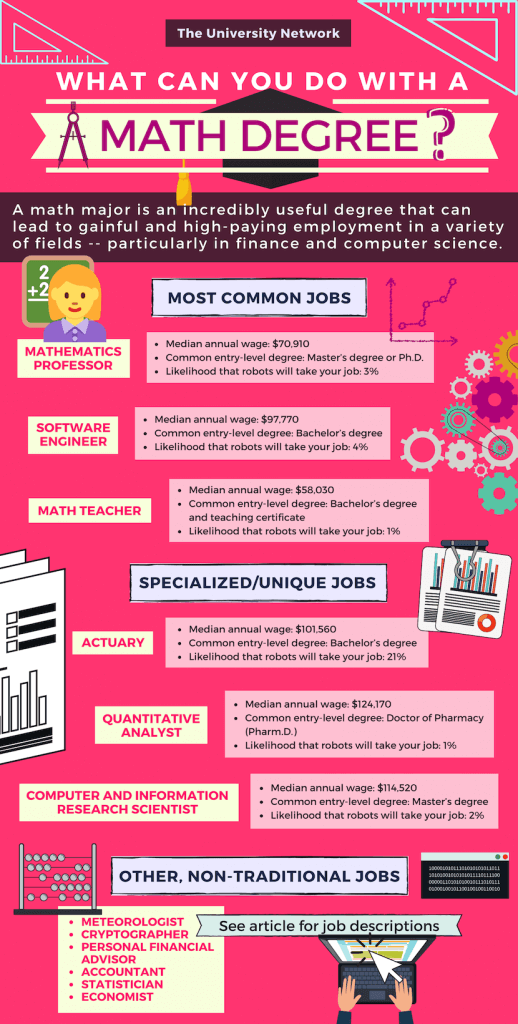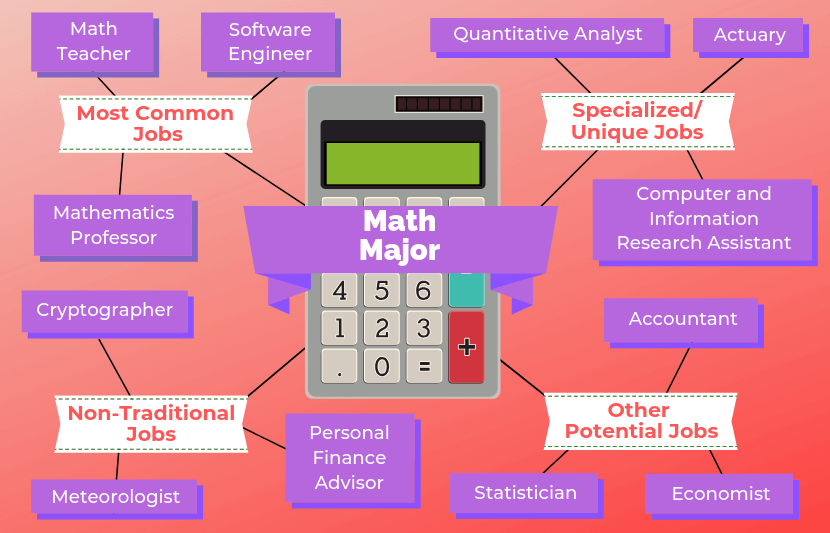Jobs for Math Majors
Math degrees are an incredibly useful degree that can lead to gainful and high-paying employment in a variety of fields. Many math majors end up working for private corporations as economists, actuaries or various kinds of data analysts, though there are also ample opportunities in government and education. Math degrees are a difficult degree, but for those who love numbers, it can be an ideal career path.
Here is a list of 12 possible jobs for math majors:
Common Jobs for Math Majors

1. Mathematics Professor
Far and away the most common career path for math majors is becoming a college professor. The job of a college professor consists of two major duties: teaching students and conducting research in their field. For many people who are interested in mathematics — particularly theoretical mathematics — this is an ideal career path as it lets them devote all their efforts to exploring the subject they love.
Median annual wage: $70,910
Common entry-level degree: Master’s degree or Ph.D.
Likelihood that robots will take your job: 3%
2. Software Engineer
Software engineering is without a doubt one of the fastest growing industries, and it is one of the best career options for math majors. Software developers and programmers may work for a variety of businesses or organizations designing, installing, testing and maintaining software systems. This job is absolutely essential to the development and maintenance of technologies. If you’re interested in becoming a software engineer, the first step is learning the basics of coding and becoming familiar with common programming languages. Typically, all you need to break into the field is a demonstrable competence in computer programming.
Median annual wage: $97,770
Common entry-level degree: Bachelor’s degree
Likelihood that robots will take your job: 4%
3. Math Teacher
Over 10% of math majors end up becoming K-12 teachers, making it one of the most common career paths in that field. Those who aspire to teach in middle or high schools have to complete an internship in a school classroom, pass the state-required test for teachers and receive a teaching certificate/license. If you’re dead set on being a teacher, the best advice would be to major in education. But if you’re still uncertain about what you want to do, a math degree will certainly help you land a job teaching.
Median annual wage: $58,030
Common entry-level degree: Bachelor’s degree and teaching certificate
Likelihood that robots will take your job: 1%

Specialized/Unique Jobs for Math Majors

4. Actuary
Actuaries use mathematics, statistics, and financial information and theory to assess the financial costs of risk and uncertainty. Actuaries work for a variety of businesses, and they are essential positions at financial consultancies, insurance agencies and banks. Aspiring actuaries must also pass a series of exams to become certified in the profession. Professional actuaries should be certified through the Casualty Actuarial Society (CAS) or the Society of Actuaries (SOA). Both groups have a unique set of tests you have to pass. If you recently graduated from college and want to become an actuary, now is the time to start preparing for those tests. They can take hundreds of hours to prepare for. Typically, an undergraduate degree is required for entry level jobs.
Median annual wage: $101,560
Common entry-level degree: Bachelor’s degree
Likelihood that robots will take your job: 21%
5. Quantitative Analyst
Quantitative Analysts, or “quants,” as they are often called in the financial industry, are experts in financial securities. Quants, who are known as the rocket scientists of the financial world, are typically employed by hedge funds and investment banks, and tasked with the highly-challenging job of developing complex models that allow companies to price and trade financial securities, using their knowledge of mathematics, computer science and finance. Because of the high level of expertise required for the position and the competitive nature of the job market, most quants have a doctorate in a related field. However, an undergraduate degree will suffice for an entry level role.
Median annual wage: $84,300
Common entry-level degree: Bachelor’s degree
Likelihood that robots will take your job: 23%
6. Computer and Information Research Scientist
Computer and information scientists are experts in computer science. They spend their day researching and designing new approaches to computer technology, oftentimes working in the fields of data science, robotics or programming, and sometimes working in more specialized fields, like biomedical technology. This job requires not only an advanced knowledge of mathematics but a deep understanding of computation theory, so in most cases, an advanced degree — either a master’s or a doctorate — in computer science or a related field is necessary.
Median annual wage: $114,520
Common entry-level degree: Master’s degree
Likelihood that robots will take your job: 2%
Non-Traditional Jobs for Math Majors

7. Meteorologist
Meteorologists use advanced modeling techniques to analyze the weather, climate and atmosphere, and develop forecasts based their analysis. This position requires a strong understanding of math and data science as well as physics and atmospheric science. Meteorologists are employed by a range of government agencies and companies, including consulting firms and agricultural companies. A math degree can be a stepping stone to a career as an atmospheric scientist or meteorologist, though you will need additional education in the field of atmospheric science or meteorology as well.
Median annual wage: $114,520
Common entry-level degree: Master’s degree
Likelihood that robots will take your job: 67%
8. Cryptographer
Cryptographers are mathematicians who work with encrypted information, making and breaking codes. You may work for law enforcement or government agencies to protect sensitive data from hackers. You likewise might work for a financial organization, making sure that account information is secure.
Median annual wage: $103,010
Common entry-level degree: Bachelor’s degree
Likelihood that robots will take your job: 5%
9. Personal Financial Advisor
Personal financial advisors work with clients to discuss and meet their financial goals, providing advice on anything from investments to mortgages to retirement funds. Depending on your role in the company you work for, and particularly if you are involved in trading stocks and making investments, you may need licensing and certification from the Securities and Exchange Commission.
Median annual wage: $90,640
Common entry-level degree: Bachelor’s degree
Likelihood that robots will take your job: 58%
Other Potential Jobs for Math Majors

10. Accountant
Accountants keep track of, analyze and archive an organization’s financial information. Depending on the size of the organization, accountants are also sometimes asked to give advice on how an organization should budget, spend and invest its money. Nearly every organization needs accountants, including hospitals, nonprofits, insurance firms, and more. Aspiring accountants should become state-certified by passing the Certified Public Accountant exam, which is administered by the American Institute of Certified Public Accountants.
Median annual wage: $69,350
Common entry-level degree: Bachelor’s degree and CPA license
Likelihood that robots will take your job: 94%
11. Statistician
Statisticians are employed in a variety of industries to collect and analyze data, which is used to help solve problems in business, engineering, the sciences, and other fields. A math degree is a perfect point of entry level jobs into this career. The level of education needed in this career depends on where you are seeking employment.
Median annual wage: $84,060
Common entry-level degree: Bachelor’s/Master’s degree
Likelihood that robots will take your job: 22%
12. Economist
Economists are employed by a variety of institutions, including governments, universities, think tanks, corporations and private research firms, to evaluate economic issues. They spend their days conducting qualitative and quantitative research for organizations in an attempt to solve economic issues or better understand the function of the economy. Depending on their employer, an economist’s duties and role might vary. For example, an economist working in government might formulate policy proposals, while an economist working for a private corporation might help the company understand how the economy might affect its business or develop strategies that will help it perform better.
Median annual wage: $102,490
Common entry-level degree: Bachelor’s degree
Likelihood that robots will take your job: 43%
Pursuing a Career in Mathematics Today
Mathematics majors possess a versatile skill set that opens doors to various career paths across multiple industries. Their analytical abilities, problem-solving skills, and quantitative reasoning make them valuable assets in today’s data-driven world. One prominent career option is that of market research analysts, who studies market conditions to understand potential sales of a product or service. These analysts gather and analyze data about consumers and competitors, relying on statistical analysis and strong communication skills, along with proficiency in software tools like SPSS and SAS. Mathematics majors fit well in this role due to their training in statistical methods and data analysis, which allows them to derive actionable insights from large datasets.
Another appealing path is that of operations research analysts. An operations research analyst uses advanced mathematical and analytical methods to help organizations solve complex problems and improve decision-making processes. An operations research analyst has skills in optimization techniques, mathematical modeling, and simulation analysis are essential, along with familiarity with programming languages like Python and R. The problem-solving capabilities of mathematics graduates enable them to create models that optimize operations and enhance efficiency, making them well-suited for this career.
Financial analysts represent yet another significant option. They assess the performance of financial investments and evaluate financial data to provide guidance on investment decisions, often within banks, pension funds, and insurance companies. Key skills include financial modeling, risk assessment, and forecasting. The quantitative analysis and financial modeling expertise of mathematics majors allow them to evaluate market trends and make informed investment recommendations effectively.
In conclusion, the career options for mathematics majors are not only diverse but also increasingly vital in our data-driven society. Each of these fields not only relies on a strong mathematical foundation but also encourages continual learning and adaptation as technology evolves.
As the importance of data and analytics continues to grow, so too does the relevance of mathematics in addressing global challenges, from financial stability to cybersecurity. The interdisciplinary nature of mathematics allows graduates to collaborate with professionals from various fields, enhancing their problem-solving capabilities and fostering innovation. This adaptability is crucial in an ever-changing job market where the ability to analyze data and make informed decisions is paramount.
Ultimately, pursuing a career in mathematics offers not only a pathway to lucrative and rewarding job opportunities but also the chance to make a meaningful impact across diverse industries. As organizations increasingly seek professionals who can interpret data and provide strategic insights, mathematics majors are well-positioned to lead in this arena. The combination of analytical skills, critical thinking, and problem-solving abilities ensures that mathematics graduates will remain integral to shaping the future of business, finance, technology, and beyond. With the right blend of education, experience, and continuous skill development, they can thrive in a multitude of roles, contributing to advancements that benefit society as a whole.
10 Famous People Who Studied Math
1. Steven Anthony “Steve” Ballmer
2. Sergey Brin
3. Marie Curie
4. Felicia Day
5. Brian Duffy
6. Reed Hastings
7. Danica Mae McKellar
8. Harvey Milk
9. Franklin Story Musgrave
10. Alan Turing
To explore options for other majors, click here.



